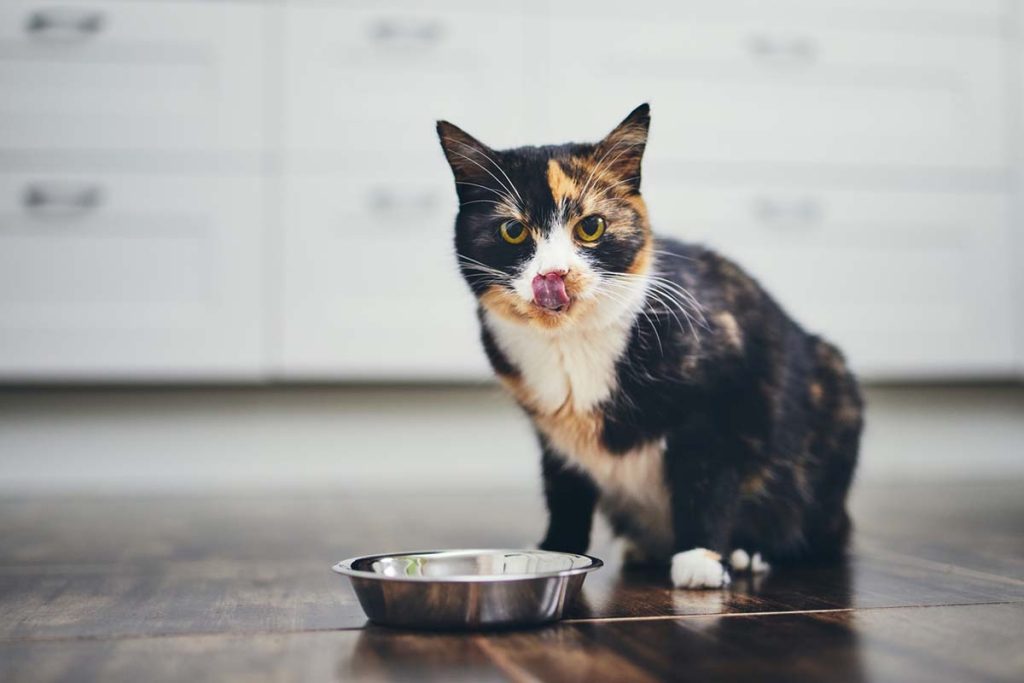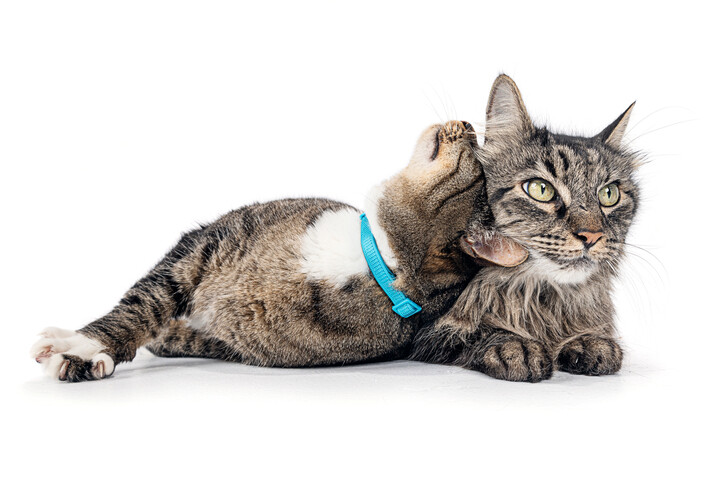Cats are wonderful companions. They are independent and good at hiding their feelings, even when they are not feeling well. An essential part of pet parenting is knowing the signs of possible cat health issues before they become bigger problems.
COMMON CAT HEALTH PROBLEMS

Unlike fleas or heartworm, which can be taken care of with a preventative, pet parents can’t prevent every condition or ailment with vaccinations or medications. You can, however, learn how to manage them with your vet’s help. Learning the symptoms of the most common cat diseases can make a difference when it comes to their quality of life.
Common health issues in cats include:
- arthritis
- hyperthyroidism
- cancer
- kidney disease
- urinary tract infection
- dental disease
- obesity
- FIV
Read on for a deeper understanding of each condition.
ARTHRITIS
It’s estimated that over 90% of cats over the age of 12 suffer from some sort of arthritis, most of the time without us knowing. Cats do not show many outward signs of joint pain. It goes unnoticed due to their docile nature, more commonly when they are seniors.
If you notice your cat has trouble climbing, using their litter box, or even daily grooming, it may be time to talk to your vet about the possibility of inflammation or irritation in your pet’s joints. Your vet may recommend weight loss, prescribe medication to ease inflammation, and natural supplements to help support mobility. Depending on the type and severity of the arthritis, they may offer physical therapy or holistic treatments such as acupuncture and massage.
HYPERTHYROIDISM
Hyperthyroidism in felines occurs when there is an increased production of thyroid hormones. The thyroid helps regulate normal body processes, such as brain development, metabolism, digestive functions and more. However, when there are excess thyroid hormones produced, it can cause a myriad of health issues in cats.
Cat owners may notice extreme weight loss and an increase in thirst, urination, and appetite. While your cat’s sudden interest in food and water might seem like a good thing, it could be a sign of an underlying issue that is worth exploring with a veterinary professional. They may perform bloodwork to confirm a diagnosis and offer treatments such as diet change, antithyroid medication, or even removal of the thyroid gland.
CANCER
Very similar to humans, cats are vulnerable to many different types of cancers and tumors with age. The most common type of cancer in cats is Lymphosarcoma, a type of blood cell called lymphocytes. If pet owners notice any unusual bumps or lumps, loss of appetite, prolonged lameness, skin infections, or difficulty breathing, take your cat to the vet for further examination.
Depending on the severity and stage, your vet and/or oncologist may suggest chemotherapy, radiation, surgery, or immunotherapy. Treatments for cancers are more evolved than they’ve ever been, so cancer is not always an end for your fur baby.
KIDNEY DISEASE IN CATS
Kidney disease and kidney failure are one of the most common problems we see in cat health. There are two types of kidney disease:
- Acute kidney failure
- Chronic kidney failure
ACUTE KIDNEY FAILURE
Acute kidney failure is sudden and can develop quickly and without warning. It is typically caused by accidental ingestion of household items such as toxic plants and flowers, poisons, pesticides, and even medication meant for human use.
Acute kidney failure can also be a result of infection or other diseases that restrict or reduce blood flow to the kidneys themselves.
CHRONIC KIDNEY FAILURE
Chronic kidney failure happens over time, and seemingly so in older cats, as with most other health issues. Signs to watch out for include frequent urination and increased thirst, rapid weight loss, and more. Your vet will want to do a blood and urine test to help diagnose the issues.
While it is not reversible, it can be managed through medication and maintaining proper nutrition. Always provide clean water to keep them hydrated and feed a restricted protein and low phosphate diet, as recommended by your veterinarian.
Urinary Tract Infections
Feline lower urinary tract disease affects the bladder and urethra of infected cats. Signs of FLUTD include frequent urination, difficulty or pain urinating, and blood in the urine. It usually happens in adult cats and older cats. An indoor cat with FLUTD may lick itself a lot more than usual (FLUTD is more prevalent in indoor vs. outdoor cats). There are several common causes of this disease, so it’s important to talk to your vet to pinpoint where the problem stemmed from in order to treat it.
Obesity
Obesity and arthritis often go hand in hand. Keep your healthy cat at its ideal weight and always get input from your vet about their diet at checkups. If you have a new cat, look into a diet that will keep them feeling their best throughout all life stages.
Dental Disease
Between 50 and 90% of cats above age four have some form of dental disease. In order to avoid conditions like gingivitis, tooth resorption, and periodontitis, it’s important to brush your cat’s teeth or get them professionally cleaned at an animal hospital to reduce plaque buildup and bad breath.
Feline Immunodeficiency Virus (FIV)
FIV is a life-threatening infectious disease that attacks the immune system. According to the Cornell Feline Health Center, this leaves them especially vulnerable to secondary infections from conjunctivitis and feline leukemia virus (FELV) to respiratory infections and anemia.
Taking Care of Your Kitty
From intestinal parasites like ringworm and tapeworms to infestations and sneezing, it’s important to seek veterinary care when your kitty is feeling off. Signs of illness like constipation, excessive drooling, hair loss, and more could mean something serious is going on.
This content is for informational use only and does not replace professional nutrition and/or medical advice, diagnosis, or treatment. It is not a substitute for and should not be relied upon for specific nutrition and/or medical recommendations. Please talk with your veterinarian about any questions or concerns.
